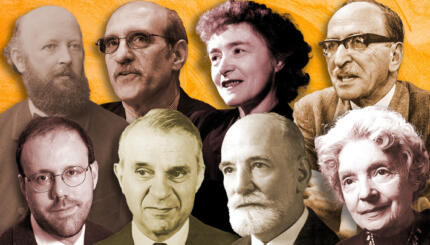Recently, I read an article about a punk-rock production of “Fiddler on The Roof.” The article caught my eye for several reasons. First of all, I’m a theater nerd, and any new-twist-on-an-old-favorite will at least earn a passing glance from me. Second of all, I have my own interesting “Fiddler” tale (which I’ll get to in a minute).
Third of all, um, hello – punk Fiddler?! As a kid raised on Topol’s performance of Tevye, picturing him wearing ripped jeans and black nail polish while screaming into a mic was enough to make me giggle.That’s what drew me to the article, but what stayed with me after I read it was not the article itself; the comments from other readers were what lingered in my mind.
There were a few positive or “hmm, that’s interesting” responses. But more prevalent were critical comments. Some of these criticisms were about this particular production, i.e.:
“G@d forbid we tell [the student actors] that dressing and acting Punk isn’t a good Jewish thing. What happened to a Jewish theater group teaching something Jewish? I am appalled”
… and others were even about “Fiddler” as a show, period:
“In it’s [sic] original it is the worst affront to traditional Judaism. The whole play is about children rejecting the laws and customs of Judaism. The only Jews who actually “love” Fiddler are those who rejected traditional Judaism themselves, but still take comfort in the memories of their grandparents’ tables. Turning it punk only added another level.”
Oy. Pretty harsh – and pretty unfair. As far as the punk version inherently being “not teaching something Jewish,” I’d argue that punk is about rebellion and questioning and figuring things out in your own way – AKA “wrestling with big questions.” AKA something pretty Jewish, if you ask me. My historian friend Stuart also pointed me to this article about how Jews contributed to the creation of punk music. We’re proud of Barbara Streisand and Mel Brooks; why not Jeffrey Hyman, AKA Joey Ramone?
As far as “Fiddler” itself being an affront to traditional Judaism, I’d say it’s the opposite. Tevye, a traditional Jew, is the story’s protagonist, and he’s a sympathetic, likable character. Traditional Judaism is treated with warmth throughout this story; we feel the pain alongside Tevye when his daughters move away from the traditions that have shaped his life– even those of us who are not “traditionally observant” can identify with struggling to understand our loved ones, and fearing our own values may be lost. More than anything, “Fiddler” is a story of transitions, choices, navigating one’s own identity and the choices of our loved ones; of finding our own way and wrestling (there’s that word again) with the angels and obstacles in our path. Like it or not, that happens to every family. Jewish, and non-Jewish.
Speaking of which, here’s my “Fiddler” story, as promised earlier: soon after I moved to Mississippi, I started auditioning for plays. As fate would have it, the first role I was cast in was Golde in a local production of “Fiddler on the Roof.” This was odd for two main reasons: first of all, I was 21 at the time, making me way the &*%$ too young to play Golde; and second of all, I was the only Jewish person (at the time) in the entire cast and crew of this “Fiddler” show.
The first item was fixed with a wig and tons of age-makeup. The second item led to a lot of questions, conversations, gentle lessons in how to correctly pronounce “L’Chaim” – oh, the stories I could tell!
Yep, this is me. With my Tevye, and a lot of age makeup (but minus my wig). Check T’s rockin’ beard!But here’s the incredible thing: despite the majority of the cast being largely unfamiliar with any sort of Jewish heritage, “Fiddler” resonated for everyone in the show. They got it. They learned something about Judaism, but also they found something incredibly universal in this particular show. Because “Fiddler” is very Jewish, and also very human.
If you took away its Jewish particularity, the story wouldn’t be as powerful; after all, a specific example is always better than bland general-ism. Yet within that specificity, there is so much room. The characters that choose tradition, those who have change thrust upon them, those who choose change – none are demonized. There are lots of different characters we can cheer for, because there are lots of ways to be [Jewish/in love/political/etc]. People find reflections of themselves, somewhere, because all of us know what it’s like to feel as if our lives are as shaky as … as … as a fiddler on the roof!
And if finding a way to tell a story about how complicated and beautiful and crazy-making family life can be isn’t Jewish, well, I don’t know what is.
That’s why I will continue to defend ‘Fiddler”- be it the traditional, punk, or a heartfelt, Southern-accented version.
What are your “Fiddler” feelings? Affection? Offense? Share your comments below…



